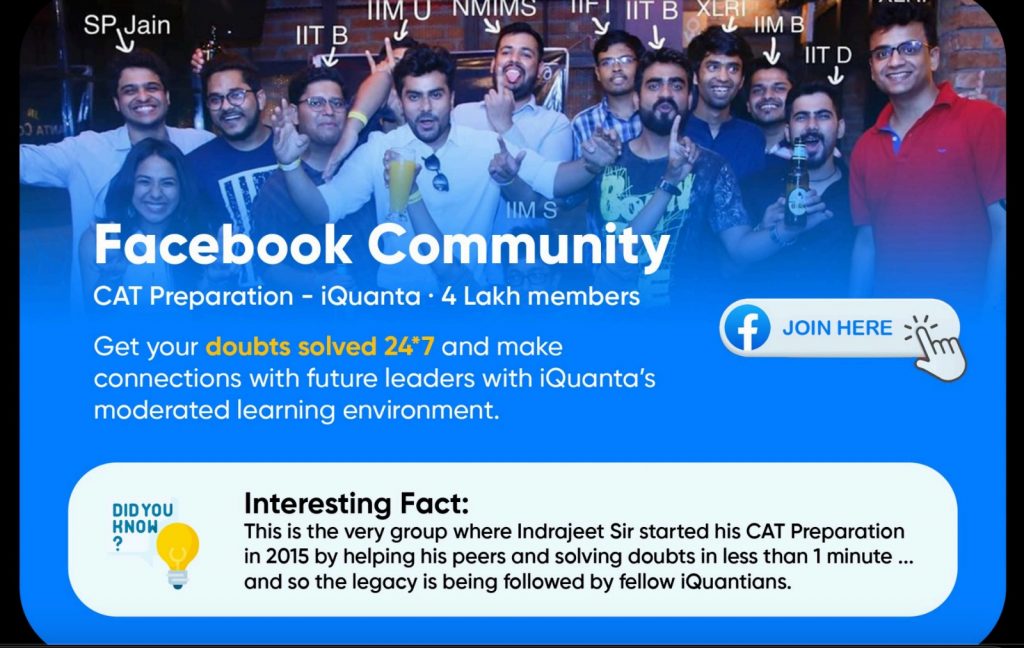
As a CAT aspirant, this blog is for you. This interesting, insightful and fun-filled conversation between Churchill Jain, a CAT Topper with 99.99 percentile in DILR. Churchill Jain was born and brought up in Indore. He did his schooling and college from Indore as well. After graduation, he worked in an analytics firm in Bangalore before he belled the CAT and secured a seat in IIM Indore with 99.38 percentile. Conversing with him is Ayush Jain, an alumnus of IIM Lucknow. This article highlights his CAT journey from why he chose the exam, how he prepared for it to how he became a topper. This article will solve every question you have in your mind regarding your CAT preparation. Let’s understand the CAT Topper’s Journey in his own words:
Join this free whatsapp group to get the latest information about CAT exam along with the strategies by CAT experts

Ayush: Hello all! My name is Ayush Jain, and I am an alumnus of IIM Lucknow. I welcome you all to yet another episode of Success Stories of iQuanta Toppers. Today, we have got Churchill Jain with us. We can call him ‘Churchill Indore’ as well, as he is from Indore, completed his schooling and graduation from Indore, and is pursuing post-graduation from Indore as well. Let’s hear from Churchill about his journey of CAT. Churchill, how are you?
Churchill: “I hail from a business family in Indore. As you mentioned earlier, I’ve completed my schooling and undergrad from Indore as well. Currently, for the past one year, I was working in an analytics firm in Bangalore. So, that’s it from my side.”
Why Did The CAT Topper Choose CAT?
Ayush: Great! So, how did you think about appearing for CAT? What was the motivation behind it?
Churchill: “Yeah, so as I was not from an IIT or an IITian, I wasn’t able to get a placement or the kind of salary one usually expects from a job. That’s why my motive was to grow in my career and give it a boost. So, I opted to go for CAT and started my preparation after that.”
Ayush: So you mentioned that your motive for taking CAT was money. Just a personal question- how much were you earning on a monthly basis?
Churchill: “It was only 23,000 to 24,000.”
Ayush: And, you are staying in Bangalore?
Churchill: Yeah!
Ayush: Did you used to save any money out of this?
Churchill: “No, nothing much. It was around 20k, and that mostly went into necessary expenses. And if we went out for parties and all, it would even go into the negative sometimes.”
His CAT Percentile and Sectional Scores
Ayush: So how much percentile did you score in CAT and what were your sectional scores?
Churchill: “So i scored 99.38 percentile so it is around 90 percentile in VARC, 99 in Quant and 99.99 in DILR.”
The CAT Topper’s CAT Preparation and Strategy
Ayush: That’s really great! And how did you prepare for CAT? I mean, what strategies did you follow? Which learning platforms did you use? What was your overall approach?
Churchill: “So, I started my preparation around the same time last year, between June and July. Initially, I joined the iQuanta group, which is one of the largest groups with the highest number of aspirants. I used to follow the group closely and noticed that many people were posting different types of questions. What fascinated me was that the students who had opted for iQuanta were able to solve those questions in a very short amount of time. That really inspired me, and then I opted for the full iQuanta course. After that, I followed the strategy suggested by Indrajeet Sir. I attended all the classes regularly, followed a definite study pattern, took mock tests, took guidance from Sir, and analyzed the mocks properly. All of this helped me improve much faster and score well.”
Ayush: Where did you get to know about iQuanta?
Churchill: “Yeah, as I mentioned earlier, I had just started my preparation, so I was searching for different platforms that could help me stay motivated and connect with other students for peer-to-peer learning. iQuanta turned out to be the best for that, so I enrolled in it.”
Key Highlights:
- Started preparation in June-July.
- Joined and observed the iQuanta aspirant group.
- Inspired by quick problem-solving skills there.
- Enrolled in full iQuanta course.
- Followed Indrajeet Sir’s strategy and attended classes regularly.
- Took and analyzed mocks consistently.
- Benefited from 24/7 doubt clearing and peer learning.
- Stayed motivated through iQuanta’s community support.
Benefits of Online Coaching
Ayush: So, I think a lot of people are very skeptical about online coaching. What are the benefits you found in online coaching compared to the traditional offline coaching options available in the market?
Churchill: “Yeah, there are a lot of benefits to online coaching. Since I’m a working professional, one of the biggest advantages for me was the flexibility. I could attend classes at any time. Even if I got free around 2 or 3 in the night, I could still access the class recordings. That was really helpful. Another major benefit was that if I didn’t understand a concept, I could revisit the class as many times as needed. The second point is 24/7 doubt clearing. In offline coaching, there’s usually a fixed time slot when the faculty is available, and you have to clear your doubts only during that time. But with iQuanta, there were 24/7 doubt-clearing sessions. I could post a question anytime and get my doubts clarified within minutes.”
Key Highlights
- Flexibility: Attend classes anytime, even late at night.
- Access to recordings: Revisit classes as many times as needed to understand concepts.
- 24/7 doubt clearing: Ask questions anytime and get quick responses, unlike fixed timings in offline coaching.
- Convenient for working professionals: Fits easily around a busy schedule.
Join the Largest CAT Preparation Community in India

The CAT Topper’s Approach for DILR Section
Ayush: That’s really great! So, Churchill, you mentioned that you scored 99.9 percentile in the DILR section. I think that’s a section that’s a nemesis for many people, and even experienced aspirants face a lot of difficulties with it. So, what approach did you follow to tackle this particular section?
Churchill: “Yeah, so I’ll start from the beginning. Every subject has some basics, so I practiced basic sets like arrangements, pie charts, bar graphs, and all those types of questions. After that, I used to solve past year CAT questions and mock tests. For DILR, there isn’t a specific book you can follow to ace the section, so I focused on solving a wide variety of sets from past mocks. I also followed the sets posted by different students in the iQuanta group. After some time, many of the sets I had practiced started appearing in mocks or even in the CAT itself. This made it easier for me to attempt and crack those sets.”
Key Highlights
- Start with basics: Practice fundamental sets like arrangements, pie charts, bar graphs, etc.
- Solve past year CAT questions and mock tests regularly.
- No single book covers everything, so solve diverse sets from mocks and student-posted problems.
- Use peer-shared sets (like those in iQuanta group) for wider practice.
- Recognize recurring patterns: many practiced sets appeared again in mocks and the actual CAT, aiding faster solving.
Materials Referred by the CAT Topper During His Preparation
Ayush: That’s great. So, you mentioned that there are no books for DILR specifically. So, what material do you think one should follow? Let’s talk about all the sections – Quant, Verbal, and DILR. What is the material that you went for?
Churchill: “So, I will start with VARC. For VARC, I used to read different articles and different zones of reading. This helped me understand the essence of the passage and what the author or poet wants to say. First, we should read about different zones. After that, you can go for RC, para jumble, and all that, and analyze why you are eliminating any options and why they are not correct. You must understand that generally, what happens with every aspirant is they can eliminate two options easily, and then it becomes a 50-50 luck situation. But we should not go with luck; we should identify which option is correct and which is not.
Then, I will go with the DILR section. As I mentioned earlier, past mocks and past CAT questions are the best sources for DILR, so we should follow those.
For Quant, we can divide the strategy chapter-wise. There will be some chapters we are good at, and some chapters we are not good at. For example, for me, the Probability and PNC part was tough, so the shortcuts provided by Sir were very helpful. We can divide the syllabus that way, practice the sections we are weak in, and then see how much we are improving in the mocks.”
Join this free whatsapp group to get the latest information about CAT exam along with the strategies by CAT experts

Key Highlights
| Sections | Highlights |
| VARC (Verbal Ability & Reading Comprehension) | Read diverse articles and explore different reading zones to grasp the author’s intent.Practice RCs, para jumbles, and option elimination carefullyAvoid relying on luck; focus on understanding why options are right or wrong. |
| DILR (Data Interpretation & Logical Reasoning) | Use past CAT questions and mock tests as primary study materials.Practice a wide variety of sets, especially those shared by peers. |
| Quant (Quantitative Ability) | Break the syllabus chapter-wise; identify strong and weak areas.Focus on weak chapters using shortcuts and tips provided by mentors.Track progress regularly with mock tests. |
Challenges Faced by the CAT Topper
Ayush: That, I think, is one thing that would be really useful for all the aspirants preparing for CAT. So, Churchill, what were the challenges you faced while you were aiming for CAT?
Churchill: “So, one of the challenges was the timing at my office — it was from around 12 noon to 12 midnight. After I came back home, it was around 1 in the night, so it was very difficult for me to prepare after that. I used to prepare for two to two and a half hours in the morning daily, and the main part of my preparation was on weekends, when I attempted mocks and analyzed them. Time management with work life was one of the toughest parts during my preparation.”
Key Highlights
- Worked a demanding office schedule from 12 noon to 12 midnight.
- Limited study time, only 2 to 2.5 hours available in the mornings on weekdays.
- Relied heavily on weekends for mock tests and detailed analysis.
- Managing time between work and preparation was the biggest challenge.
Approach Towards Mocks by the CAT Topper
Ayush: So, coming to the marks, as you mentioned, what do you think is the importance of mocks, and what is the ideal number of mocks that an aspirant should appear for?
Churchill: “So, mocks are the most important thing because only theoretical preparation is not enough for CAT. You have to decide how you should attempt the mock or test within the three hours of time. I attempted around 30 to 35 mocks. After that, you must focus on each section and figure out how to ace it. If one of your sections is not good, for example, in the last CAT, VARC was a bit tough, when you move on from VARC, you should have a fresh mindset. You cannot let one section affect the other two sections as well. So, that’s the mindset.”
Ayush: What is the ideal number of mocks that the person should appear for?
Churchill: “I think everyone should give 30 plus mocks because, in some mocks, our scores are not that good. We have to identify our mistakes, and after that, we need to improve in the other mocks. So, at least after 10 to 15 mocks, we identify our weak sections and all that. After that, we can prepare again and give 5 to 10 more mocks. So, it comes to around 25 to 30 mocks.”
Key Highlights
- Mocks are crucial.
- Attempted around 30- 35 mocks for thorough preparation.
- After each mock, analyze each section to improve weak areas.
- Keep a fresh mindset: don’t let a tough section affect the rest of the exam.
- Ideal number of mocks: at least 30 to identify mistakes, work on weaknesses, and improve steadily.
Is 5 Months Enough for CAT Preparation?
Ayush: So, I think you mentioned that you started preparing somewhere in the month of June last year. Do you think that a span of five months is sufficient for a person to crack an exam like that?
Churchill: “Yeah, I definitely feel it is more than sufficient because CAT generally tests our basic knowledge of all three sections and how we can manage our stress on the D-day. It’s not about reading all the books or completing all the material; it’s just about the basic concepts we follow and how we manage our time and stress on the D-day.”
Key Highlights
- Five months is definitely enough to crack CAT.
- CAT mainly tests your basics across all sections.
- Success depends more on mastering core concepts and managing stress on exam day than on completing every book or material.
- Time and stress management are key to performing well.
How Did iQuanta Help?
Ayush: So, Churchill, I mean, how did iQuanta help you in your overall journey?
Churchill: “So, I will say it’s like a guide. Indrajeet Sir guided me a lot — he was a mentor who helped me prepare my strategies and improve my score. Apart from that, the peer learning I got from iQuanta was great because what happened was everyone was posting some tough questions that they were not able to solve. In this way, we were preparing ourselves for the toughest CAT exam possible. So, if the exam is easier, it will be very easy for us to score well. This helped a lot. So, I would say everyone should enroll in iQuanta and join this coaching to get proper mentorship, guidance, and peer-to-peer learning.”
Key Highlights
- iQuanta was as a reliable guide throughout his preparation journey.
- Indrajeet Sir provided personalized mentorship and strategy guidance.
- The peer learning environment was invaluable, aspirants shared tough questions, preparing everyone for the hardest possible CAT.
- This exposure made the actual exam feel easier.
- Overall, iQuanta offered strong mentorship, structured guidance, and a supportive peer community.
What Would the CAT Topper if Given Another Shot at CAT?
Ayush: Great! So, Churchill, you already scored above the 99th percentile, but let’s say you get another shot at CAT, what is one or two things you’d like to do differently this time?
Churchill: “Yeah, so for engineers, the general trend is that VARC is the weakest section and DILR is usually good. I will try to improve my VARC score because I feel I scored 90 percentile in VARC while the others were around 99 plus. If I score around 98 – 99 in VARC, then it will lead me to around 99.9 percentile. So, I will try to improve on that next time.”
Tips for CAT Aspirants Like You
Ayush: That is great, I think that’s really insightful! So, just the last question for you — what are a few tips you’d like to give to future aspirants? Because, I mean, these are really challenging times. People are worried about a lot of factors, a lot of external things. So, what do you think a person should do to calm themselves and get on the right track to prepare for CAT?
Churchill: “Yeah, I will say that it’s not like every aspirant starts from 99 percentile. Every aspirant starts from around 90- 92, and then the preparation leads them towards 99. Even my initial scores were around 90- 91 percentile. So, it’s like a journey of ups and downs. You should always understand that you can’t get demotivated. You should stay motivated to prepare consistently, focus on your mistakes, and improve them in the upcoming mocks.”

A Fun Ending – Rapid Questions with the CAT Topper
Ayush: So, Churchill, before we wrap up our interview today, I’m going to ask you five rapid-fire questions:
Q: You spend quite a lot of time in Indore and you you’ll be spending more time in Indore in the future so what is your favorite food and favorite food spot in indore?
Churchill: “I will say Sarafa, and my favorite food will be Poha Jave”
Q: You lived in Bangalore for almost a year, so what are the best getaway spots in Bangalore?
Churchill: “Nearby it can be the Nandi Hills and if you want to go for a long distance it can be Ooty.”
Q: Who is your favorite favorite cricketer?
Churchill: “Virat Kohli”
Q: One thing that you like most about iQuanta?
Churchill: “24/7 doubt clearing sessions”
Q: How Many Girlfriends You Have?
Churchill: “zero”
Ayush: Hopefully you get one in IIM Indore!
Churchill:“Yeah, that can be my motivation!”



